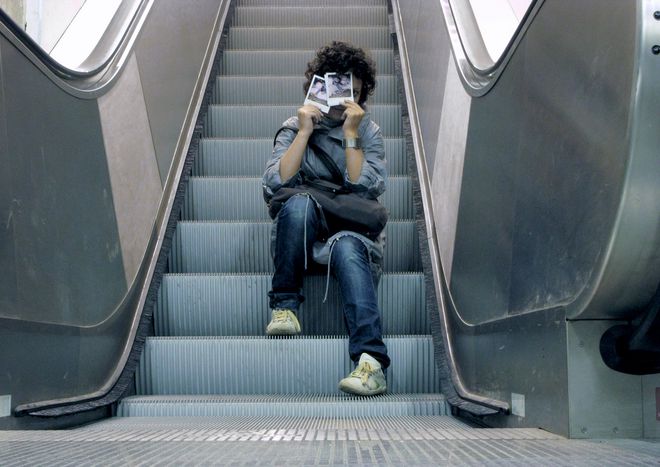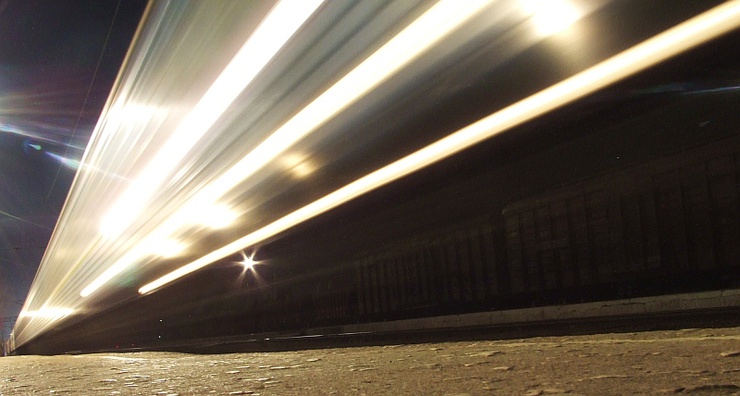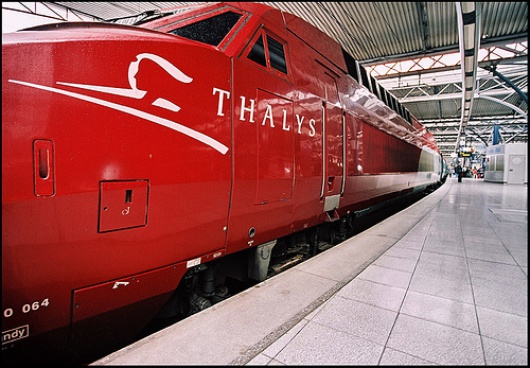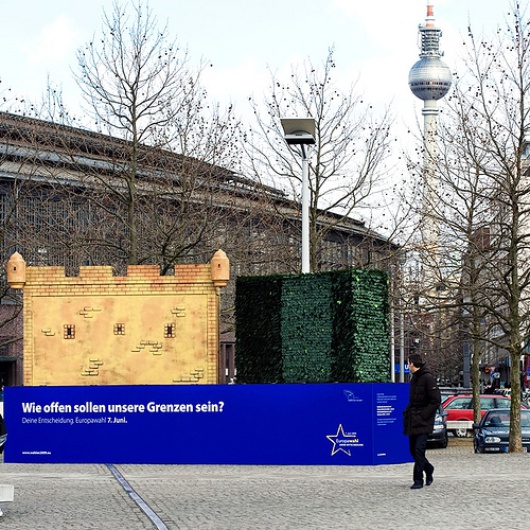
A traveller reads up on the history of nationalism
Published on
Translation by:
Annie Rutherford'A sudden wave of satisfaction envelops J. He recognises his happiness to have been born this millennium in a peaceful Europe'. This short story, set in a Brussels train station, was runner-up of the 2009 German Youthreporter award, ‘Verliebt in Europa’ (‘In Love With Europe’)
J is reading with such fascination that the hectic goings on at Brussels train station hardly bother him. He pays no attention to the bright summer weather, nor to the passersby bustling about around his bench. 'The causes of both of the world wars in the last millennium are above all to be found in increasing nationalism,' his laptop informs him. 'While the first great war in the twentieth century was the result of all European nations simultaneously striving for expansion, the second world war broke out as a result of the combined effect of three factors: the hubris of a people who considered themselves to be chosen, the worldwide recession and also a high potential for violence in people throughout throughout the whole of Europe.'
He highlights the words nationalism and recession, as he only has a vague idea of their meaning
J is fascinated and perplexed at the same time. He highlights the words nationalism and recession, as he only has a vague idea of their meaning. He does think that he remembers that nations in the past century before the great union have something to do with different languages and so-called borders. But although he has concerned himself with older time for a long while, many concepts and thoughts of the people at that time are still a mystery to him.
While he reads the summary article Second Millennium, he suddenly notices a passerby standing before him, talking to him. In his concentration J had not noticed him at all at first. Dov'è si trova il prossimo distributore? ('where's the closest cash machine?') repeats the man. J understands that he is speaking Italian. It takes some effort to reply immediately; to do so he switches to Spanish and the man opposite him understands. J kindly points out the way to the nearest food kiosk.

Back to observing the passersby, he tries to imagine the old times. People from different regions of Europe then lived far removed from one another. Travelling was reserved for the privileged. There were no high-speed trains. Only the elite were in the position to communicate with people from other countries. It's easy to hate what you don't know, J thinks. On top of that, at the time energy and food resources were limited. As technical development was still taking its first baby steps, humanity was constantly struggling for scant resources.
J considers: so much had changed since those days. Even his great-grandparents grew up speaking many languages. High speed journeys had long been taken for granted; in addition inter-cultural peace training was a priority in schools. And through fair sharing as well as technical innovation there was no longer any material poverty. A sudden wave of satisfaction envelops J. He recognises his happiness to have been born this millennium in a peaceful Europe.
An announcement from the video screen draws his attention from his thoughts. The high-speed train from Kiev is delayed. That was her train. J had not seen her for several weeks and he missed her. He noticed that particularly in the evenings.
 But delays in trans-European transport had become more frequent in recent weeks. No need to worry then. The reason behind it was the construction of the grid in the Caucausus, which was initiated by the European government in order to support the Asian regions. J immerses himself again in his reading. Anticipation was always the most beautiful happiness. He would read a little more before meeting her.
But delays in trans-European transport had become more frequent in recent weeks. No need to worry then. The reason behind it was the construction of the grid in the Caucausus, which was initiated by the European government in order to support the Asian regions. J immerses himself again in his reading. Anticipation was always the most beautiful happiness. He would read a little more before meeting her.
On his computer screen he clicks on a further link and begins to read afresh: nationalism – a predominant political ideology in Europe extending into the twenty first century. The N acts on the assumption that the people of a region have advantages over other groups – so called nations - on account of their skin colour, cultural achievements, economic power or religion. In principle, the N denies the coexistence of people from different origins. In the course of the great union the N was gradually displaced into human relationships through solidarity and the priority of peace.
J is now no less confused than before: how had religion separated different nations then? J. had always experienced this as something pure. Although he didn't visit the rituals often, the harmony of the different faiths there still seemed to be magic to him. They united all people. How was religion meant to separate people then? He enters the words 'religion in the second millennium' into his computer. An article several pages long appears on the screen, which he bookmarks. As he still has some time before her train arrives, he decides to search out one of the quiet rooms in order to relax a bit, maybe to sleep. The train station business has tired him out somewhat.
**
Muffled light shines in the quiet room. It smells faintly of essential oils. It is pleasantly cool but not cold. J finds a free armchair immediately. Despite his tiredness he decides to return to reading once more. He likes the feeling when when his eyes close from tiredness after reading and the meaning drifts into the realm of dreams. He considers what he has learnt today: hating others, simply because they are different . . . although everyone differs from others, is unique. That's quite normal.
J remembers that he still wants to read up about religion. The relaxation music changes smoothly from early classical to asian sounds. He takes the small screen in his hand again. In the twentieth century, he reads, religion was often the cause and excuse for military opposition. Because both believers as well as those initiated into different cults acted on the assumption that their own belief was infallible and superior.
J is once more disturbed from his reading when cries from outside force themselves on his ears. Barked orders follow. The other guests in the quiet room also shoot out of their armchairs as if hit by a bullet. A deafening hissing sounds.
Together with the rest of the guests in the quiet room he surges to the exit in order to look for the cause of the noise. 'What the...?' calls an elderly man who reaches the plastic glass door before him. As J stumbles across one of the armchairs to the exit, a horrible suspicion comes to him. He knows what has happened and recognises the sound even before he sees the source. It has been caused by a shot with a stupefaction weapon. 'Somebody's shooting!' he calls out. But the sight which meets him before the door exceeds all his fears. Several men in dark blue protective suits – to whom do they belong? - are aiming their weapons at people. J could hardly grasp it. Violence. Completely out of the blue. Was kind of unity is that? It had never seen such . . . soldiers. Reflective helmets. Arm and leg pads. Headsets for communication. No regalia.
 Only now does he perceive about a dozen people, sprawled on the floor like seals. Flat on their stomachs but with their heads raised. They have crossed their hands behind their head. Their eyes wide open, they gaze at the reflective visers of the troops standing around him. The people visibly fear for their lives. J realises that they all have asian facial traits. He stops thinking. What is going on here? Who is taking the law into his own . . . ? 'Every person a marvel,' shoots through his head. The preamble to the European constitution.
Only now does he perceive about a dozen people, sprawled on the floor like seals. Flat on their stomachs but with their heads raised. They have crossed their hands behind their head. Their eyes wide open, they gaze at the reflective visers of the troops standing around him. The people visibly fear for their lives. J realises that they all have asian facial traits. He stops thinking. What is going on here? Who is taking the law into his own . . . ? 'Every person a marvel,' shoots through his head. The preamble to the European constitution.
'You dirty immigrant scum! You want to steal our prosperity! We don't need you!' The voice of the troop leader cuts into his thoughts. The uniformed man turns in the direction of his team: 'Load! Fire on my command!' All of this only lasts a few seconds but to J, it seems as if it runs on a loop in a film.
He can't do anything else now. He has to intervene. Now, before it is too late. He storms from the door to the troop leader and . . . slips. Before he has really set himself in motion he is already paralysed by a quick hit. Pain mixed with noticeable vibrations block his mind. He can hardly feel his legs any more. What the devil has hit him there? Before his eyes everything goes black and he slowly sinks to the floor. The droning engages his whole body; the cries and the shooting however sound more and more muffled in his ear until they die out.
He opens his eyes abruptly. The quiet room is empty. The calming sounds of running water and birdsong come from the loud speaker. The rest of the guests have already gone. Perplexed J rubs his eyes, while slowly raising himself from his chair. Where are the masked troops, where the . . . sweat drips from his forehead; his t-shirt stuck to his body. He has been dreaming.
He only grasps slowly at first that the droning noise comes from the blackberry in his trouser pocket. Somebody is trying to reach him. Still not quite with it, he activates the answer phone. It is her. Relief floods him as he hears her voice: 'Sweetheart, it's me. The express from Kiev is somewhat delayed. Where are you? I'm standing on the platform, waiting.'
**
A better future is possible.
**
 The jury says: 'Malte Koppe, 26, devotes his vision of the future to a completely united Europe, in which a traveller can only marvel at the eventful past of the continent'
The jury says: 'Malte Koppe, 26, devotes his vision of the future to a completely united Europe, in which a traveller can only marvel at the eventful past of the continent'
Translated from Unser Europa. Eine Vision



